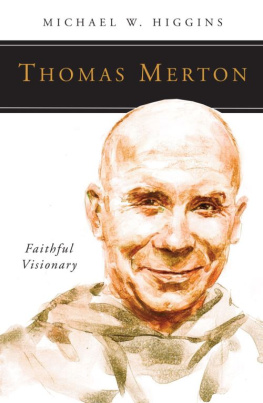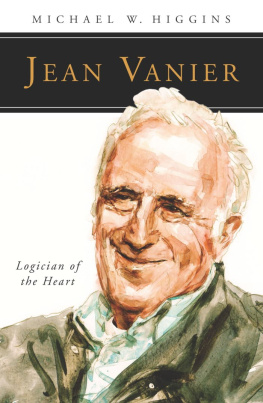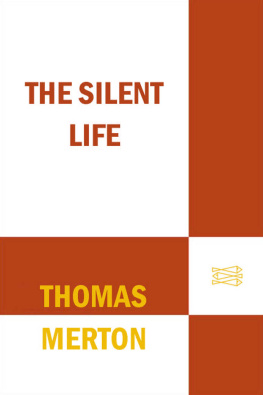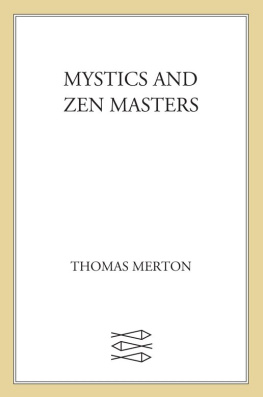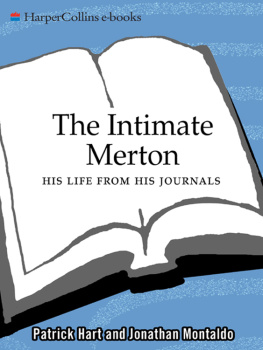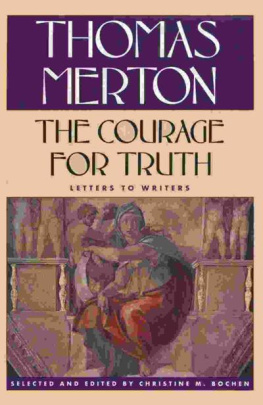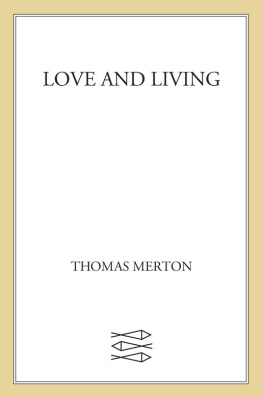Acknowledgments
Thomas Merton: Faithful Visionary draws very heavily on much of my previous work: published scholarly texts, radio documentaries, television commentaries, public lectures, and so on. These include Heretic Blood: the Spiritual Geography of Thomas Merton (Stoddart, 1998) with French and Italian translations appearing in 2000 and 2001, respectively, Thomas Merton: La voie Spirituelle dun hrtique (Bellarmin), Sangue Eretico: la Geografia Spirituale di Thomas Merton (Garzanti); scholarly articles in American Benedictine Review, Cistercian Studies, and the Merton Annual ; the St. Thomas More College, University of Saskatchewan Keenan Lecture of 1988; Heretic Blood: a Spiritual Audiobiography, Out of SilenceA Voice, Laboratory of the Spirit, Monk on the Run, and Monasticism as Rebellion, for the Canadian Broadcasting Corporation; and Now You Know Medias The Seven Story Mountain and the Rest of the Story.
In addition, I am indebted to CBC Ideas Executive Producer Emeritus Bernie Lucht, Merton aficionados composer Peter Togni and editor Kevin Burns, and numberless Merton scholars throughout the world.
The painstaking and meticulous transcriptions of the various radio documentaries and interviews were the result of the discerning and intelligent labors of Rebecca Higgins, while much of the organizational and scheduling duties were orchestrated by my very able administrative assistant, Ami Neville.
As is always the case, the support, both critical and affective, I can rely on from my spouse for four decades, Krystyna, is my foundation stone.
Chapter One
From Prades to Cambridge
The travel writer Bruce Chatwin argued that people are at their most sane and contented when journeying, observing that as a general rule of biology migratory species are less aggressive and more egalitarian than their sedentary, home-hugging counterparts.
There is one obvious reason why this should be so. The migration itself, like the pilgrimage, is the hard journey: a leveler on which the fit survive and stragglers fall by the wayside.
Thomas Merton would perfectly appreciate Chatwins analysis as it applied to his own condition: a perpetual wanderer and seeker of origins. Merton regarded humanity as instinctive wanderers. He saw the spiritual journey or pilgrimage as a metaphorical peregrinatio, or going forth into strange countries. He himself undertook the hardest of journeys, and as a consequence became by the time of his death the most spiritually fit of his age.
In his fifty-three years of earthly life Merton was not unaccustomed to journeys. He took many of them, from France to England, from Long Island to Bermuda, from Cambridge to Columbia University, from New York to Havana , culminating in the journey that brought him from St. Bonaventures College in Olean, New York, to the Abbey of Our Lady of Gethsemani in Kentucky. What inspired these journeys was no doubt a combination of emotional restlessness, intellectual curiosity, and spiritual longing; even when Merton had presumably found, in the Trappist vow of stability, palliative for his disquiet, he yearned still for the wisdom of the Rinpoche and the insight of the lama, prompting one final journey to the East.
To begin at the beginning: the First World War was in progress when Merton began his first life on January 31, 1915, in Prades, France. He was the elder of two boys, the son of an American, Ruth Jenkins, and a New Zealander, Owen Merton. From the outset there was a difference in religious sensibility as noted by Mertons close friend and biographer John Howard Griffin:
At the end of the first year of his life, Merton was baptized even though this was probably the fathers doing only because his mother didnt want any spurious religious influences brought to bear until he was of an age to decide for himself.
The Second World War was in progress when he began his second life on December 10, 1941, in Trappist, Kentucky, by entering the Order of Cistercians of the Strict Observance (OCSO) at the Abbey of Our Lady of Gethsemani. He began his third lifethe nature of which I will leave to the speculations of theologianson December 10, 1968, in Bangkok, Thailand.
Merton was even born en route. His parents were both artists and they succeeded in conveying to him something of the integrity and respect of the artists vision of things. Of his father in particular, Merton noted the parallels with Paul Czanne. Owen painted like the nineteenth-century French artist and possessed a vision of the world that was balanced, deeply respectful of structure, and deeply impressed by the integrity of all created matter.
Owen was, in the words of Mertons official biographer Michael Mott, a painter of great promise up to the age of nineteen, at which point he seems to have slowed down. Certainly Owen had an unsteady, though romantic, start in life. He met Thomas Mertons mother at an art school in Paris, and after they married they moved to the small Pyrnes town of Prades, a site where Owen could indulge his love for the life of the French peasant and make a living from the tourist trade. But war interceded. The tourists stopped coming and the peasants were conscripted. Ruth was drawn to the Quaker tradition of pacifism and persuaded Owen, possibly against his better judgment, not to join the French forces in the war effort. This stance was not appreciated by the New Zealand side of the family.
Mertons mother was a strong person and she left her stamp on young Tom at the very beginning. As Michael Mott observes:
Thomas Mertons earliest memories were of his mother writing down everything that he did in a book. The record, the long record of Thomas Merton, begins with his first biographer, his mother, Ruth Jenkins. And the fact that everything he did was worthy of writing down, I think, had a profound influence on his life. Without playing the game of pop psychology, I think you can see Mertons autobiographical impulse growing out of his mothers attention to his singularity. Throughout his life he was certainly convinced that everything he did was of sufficient importance to write down. All his life. He was fascinated by himself. Sometimes that brought an acute self- consciousness , a sharp egotism, but it also sharpened his memory. I have one bit in my biography, The Seven Mountains of Thomas Merton where I show how Merton was able to reconstruct from memory, about seven years after it happened, a bus trip that he had taken in England going from home to school, with every shop and important sight recorded. I dont know many of us who have that kind of memory whereby we can reconstruct whole streetsbuildings, shop signs, and the restseven years after weve left the location.
One other thing that I think is very important about Ruths influence on her son can be found emerging from her skill as a decorator. She was persuaded of the extreme importance of place or environment in shaping our lives. To that end she worked very hard, even though they had no money at all in Prades, to make the little room in which Tom was living as right as it could be. She would do this later when they were even in more straitened circumstances. The importance of place in his life he clearly inherited from Ruth.
His parents also managed to convey that need and taste for creative mobility that in other circles might be called instability. In 1916, barely a year after his birth, the family moved to the United States, living variously in Maryland and New York. Eventually the Mertons settled in Douglaston, Long Island, with Ruths family. This was not a happy situation for Owen. He was a proud man, determined to keep his family fed and housed. Tension arose between Owen and Ruths father, the formidably practical Pop Jenkins, who had made a small fortune in films, book publishing, and sales. Owen and Ruth moved to a little shack of a place. On November 2, 1918, John Paul Merton was born. Toms unassailable primacy of place in his mothers affections was at an end. In three years she would be dead, but it would take him a lifetime to come to terms with her death. Mott does not underestimate the powerful effect her death had on the impressionable Tom:

